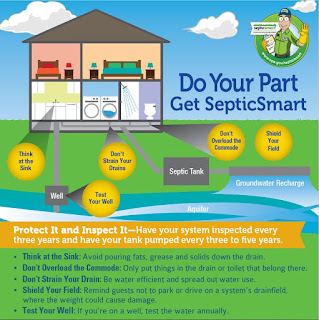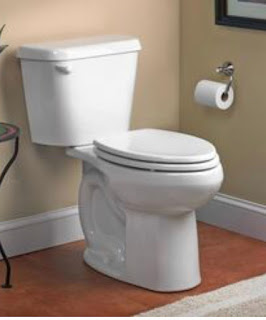NATIONAL SMART SEPTIC WEEK...yep, it's a thing
So, I realize it has been a while, but I was so excited to learn some super "fun facts" about my industry! Did you know, there is a National Septic Week?!
I promise, I'm not lying.
It is actually September 17-21 (not sure why we don't get a Monday-Friday kind of week, but I will take what I can!) Obviously, when this fabulous information came to me, I had to break out the old "writing fingers" and share this news with the WORLD! (Or at last my very small following of readers...the people who feel sorry for me because I have nothing better to write about than the subject of poop...but I digress...)
It is National Septic Week so I'm going to pass along to you some tid bits that more than likely I have shared before, but now with the help of the EPA and the Nebraska Extension offices. Here are some line items both these agencies want homeowners to mindful of so they can be "septic safe"
THINK AT THE SINK
Be careful what you put down your drain. Cooking oil and other greases can be very harmful to your system -- avoid pouring them down your drain
When you have a clog, either use boiling water or a drain snake to break it free.
Paints, solvents, or large quantities of chemical cleaners should never be poured down your drain.
Whenever possible, reduce or eliminate the use of your garbage disposal. These food particles put unwanted greases or oils in your system that can tweak with the layers of your septic tank.
DON'T OVERLOAD THE COMMODE
Never flush anything -- solids or liquids -- besides human waste or toilet paper.
(Side note -- the cheaper lesser ply toilet paper is best for dissolving in the line and tank. It's a little crass, but if you can remember "the better it feels the worse it is for your septic system" as a rule of thumb on your toilet paper choice).
DON'T STRAIN YOUR DRAIN
Conserving water is key to your septic system. We don't often realize how much water we use in a day. According to the EPA, the average person uses 75 gallons of water per day. The less water we use, the easier it is on the septic system and the longer life your system will have!
Always consider installing high-efficiency toilets, shower heads, washing machines, etc. All these appliances can help reduce the water flowing to your system.
SHIELD YOUR FIELD
Do NOT DRIVE on your lateral/drain field. This can damage the laterals underneath that are dispersing the water below.
Only plant grasses or plants with small root systems on the drainfield. Trees and shrubs should be kept at least 30 feet away from this area. Their large root systems can damage a field over time.
Be mindful of where your stormwater drains to -- try to keep your lateral field free from excess water as much as possible.
Don't "water" your lateral field. Though we understand you might want a pretty green lawn, make sure your sprinklers aren't saturating your drainfield too!
PROTECT IT AND INSPECT IT
Set a regular schedule to have your tank pumped by a certified professional. It is recommended every 3-5 years to have your tank pumped based on the activity level in your home. The more people living in your home, the less time you want to wait between pumpings.
Keep records of your system location and design. This can be useful in the future. Also, keeping records of each pumping too!
FOR MORE INFORMATION
Nebraska Extension has info on wastewater resources http://water.unl.edu
US EPA has some info too! www.epa.gov/septic
I promise, I'm not lying.
It is actually September 17-21 (not sure why we don't get a Monday-Friday kind of week, but I will take what I can!) Obviously, when this fabulous information came to me, I had to break out the old "writing fingers" and share this news with the WORLD! (Or at last my very small following of readers...the people who feel sorry for me because I have nothing better to write about than the subject of poop...but I digress...)
It is National Septic Week so I'm going to pass along to you some tid bits that more than likely I have shared before, but now with the help of the EPA and the Nebraska Extension offices. Here are some line items both these agencies want homeowners to mindful of so they can be "septic safe"
THINK AT THE SINK
Be careful what you put down your drain. Cooking oil and other greases can be very harmful to your system -- avoid pouring them down your drain
When you have a clog, either use boiling water or a drain snake to break it free.
Paints, solvents, or large quantities of chemical cleaners should never be poured down your drain.
Whenever possible, reduce or eliminate the use of your garbage disposal. These food particles put unwanted greases or oils in your system that can tweak with the layers of your septic tank.
DON'T OVERLOAD THE COMMODE
Never flush anything -- solids or liquids -- besides human waste or toilet paper.
(Side note -- the cheaper lesser ply toilet paper is best for dissolving in the line and tank. It's a little crass, but if you can remember "the better it feels the worse it is for your septic system" as a rule of thumb on your toilet paper choice).
DON'T STRAIN YOUR DRAIN
Conserving water is key to your septic system. We don't often realize how much water we use in a day. According to the EPA, the average person uses 75 gallons of water per day. The less water we use, the easier it is on the septic system and the longer life your system will have!
Always consider installing high-efficiency toilets, shower heads, washing machines, etc. All these appliances can help reduce the water flowing to your system.
SHIELD YOUR FIELD
Do NOT DRIVE on your lateral/drain field. This can damage the laterals underneath that are dispersing the water below.
Only plant grasses or plants with small root systems on the drainfield. Trees and shrubs should be kept at least 30 feet away from this area. Their large root systems can damage a field over time.
Be mindful of where your stormwater drains to -- try to keep your lateral field free from excess water as much as possible.
Don't "water" your lateral field. Though we understand you might want a pretty green lawn, make sure your sprinklers aren't saturating your drainfield too!
PROTECT IT AND INSPECT IT
Set a regular schedule to have your tank pumped by a certified professional. It is recommended every 3-5 years to have your tank pumped based on the activity level in your home. The more people living in your home, the less time you want to wait between pumpings.
Keep records of your system location and design. This can be useful in the future. Also, keeping records of each pumping too!
FOR MORE INFORMATION
Nebraska Extension has info on wastewater resources http://water.unl.edu
US EPA has some info too! www.epa.gov/septic



Comments
Post a Comment